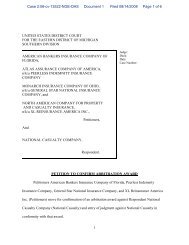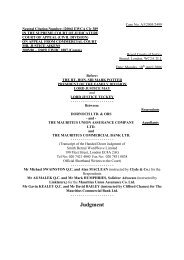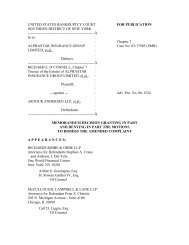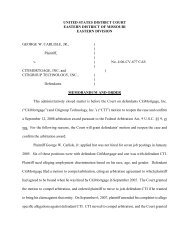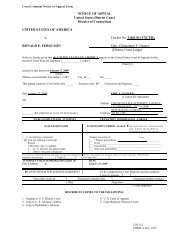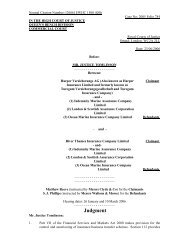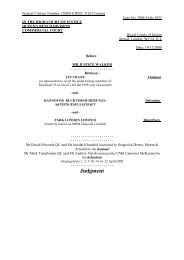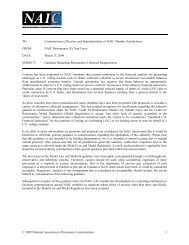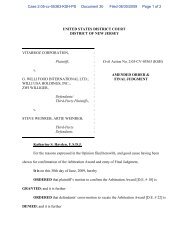Statutory Issue Paper No62R - Reinsurance Focus
Statutory Issue Paper No62R - Reinsurance Focus
Statutory Issue Paper No62R - Reinsurance Focus
You also want an ePaper? Increase the reach of your titles
YUMPU automatically turns print PDFs into web optimized ePapers that Google loves.
Property and Casualty <strong>Reinsurance</strong><br />
SSAP No. 62R<br />
A: Because the statement of income cannot be restated, previously recognized gains and<br />
losses are not revised. If the contract was entered into before, and not renewed or<br />
amended on or after, January 1, 1994 and covers only losses occurring or claims made<br />
before that date, or the contract expired before January 1, 1995 and was not renewed or<br />
amended on or after that date, it would continue to be accounted for in the manner<br />
provided before these revisions.<br />
For accounting periods commencing on or after January 1, 1995, existing balances<br />
relating to contracts which do not transfer insurance risk and which were entered into on<br />
or after January 1, 1994 (covering losses occurring or claims made after that date) would<br />
be reclassified as deposits.<br />
Premium payments to a reinsurer would be recorded as deposits. Likewise, losses<br />
recoverable from a reinsurer would not be recognized as receivables. Rather, any<br />
reimbursement for losses would be accounted for upon receipt as a refund of a deposit.<br />
23. Q: What is the definition of past insurable events that governs whether reinsurance coverage<br />
is prospective or retroactive? For example, could a reinsurance contract that covers losses<br />
from asbestos and pollution claims on occurrence-based insurance policies effective<br />
during previous periods be considered prospective if the reinsurance coverage is triggered<br />
by a court interpretation that a loss is covered within the terms of the underlying<br />
insurance policies?<br />
A: The distinction between prospective and retroactive reinsurance is based on whether a<br />
contract reinsures future or past insured events covered by the underlying reinsurance<br />
contracts. In the example above, the insured event is the occurrence of loss within the<br />
coverage of the underlying insurance contracts, not the finding of a court. Therefore, the<br />
fact that the asbestos exposure or pollution is covered under insurance policies effective<br />
during prior periods makes the reinsurance coverage in this example retroactive.<br />
24. Q: Would the answer to the above question change if the reinsurance were written on a<br />
claims-made basis?<br />
A: No. The form of the reinsurance—whether claims-made or occurrence-based—does not<br />
determine whether the reinsurance is prospective or retroactive. A claims-made<br />
reinsurance contract that reinsures claims asserted to the reinsurer in a future period as a<br />
result of insured events that occurred prior to entering into the reinsurance contract is a<br />
retroactive contract.<br />
25. Q: What is the effect of adjustments to future premiums or coverage in determining whether<br />
reinsurance is prospective or retroactive?<br />
A: Adjustments to future premiums or coverage may affect the accounting for a reinsurance<br />
contract. Whenever an adjustment results in a reinsurer providing new or additional<br />
coverage for past insurable events, that coverage is retroactive. For example, if<br />
subsequent years’ premiums under a multiple accident year contract create additional<br />
coverage for previous accident years, the additional coverage is retroactive, even if the<br />
original coverage provided in the contract for those accident years was prospective.<br />
Likewise, if current losses under a multiple-year contract eliminate coverage in future<br />
periods, some or all of the premiums to be paid in those future periods should be charged<br />
to the current period.<br />
© 2009 National Association of Insurance Commissioners 62-29


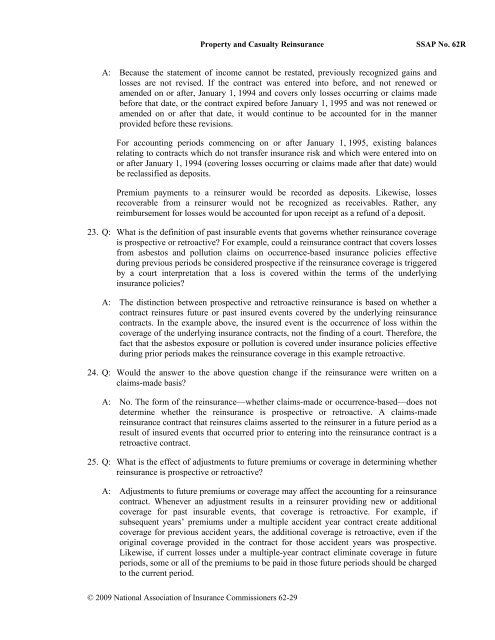
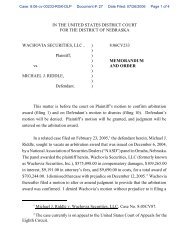
![202 Folio No 734 Neutral Citation Number: [2006] EWHC 1345 (QB ...](https://img.yumpu.com/50015000/1/184x260/202-folio-no-734-neutral-citation-number-2006-ewhc-1345-qb-.jpg?quality=85)
